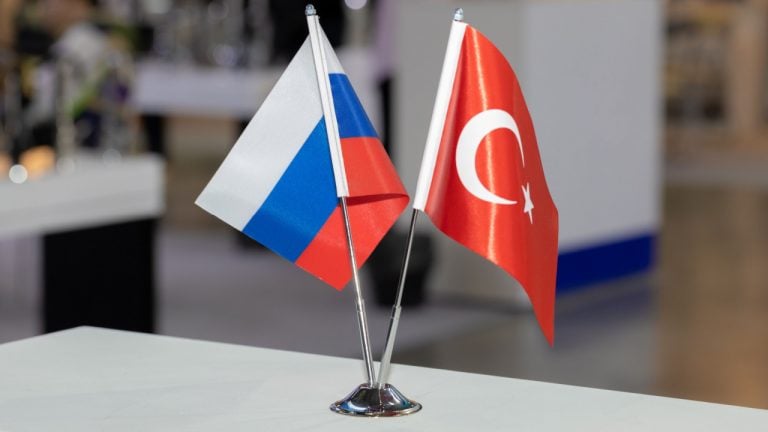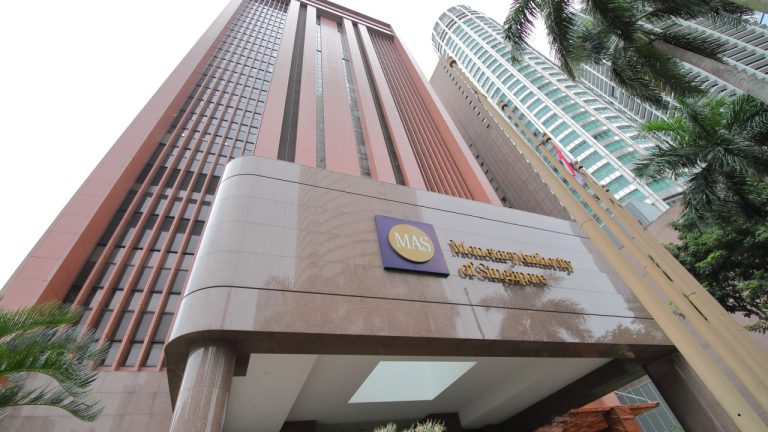 A report shows Ukrainian Cyberpolice identified members of a group that defrauded people around the world through fake crypto investment offers. The criminal organization maintained offices and customer service centers with thousands of employees in a number of European countries. Cyberpolice Department Busts Ukrainian Arm of International Financial Fraud Scheme The cybercrime combatting unit of […]
A report shows Ukrainian Cyberpolice identified members of a group that defrauded people around the world through fake crypto investment offers. The criminal organization maintained offices and customer service centers with thousands of employees in a number of European countries. Cyberpolice Department Busts Ukrainian Arm of International Financial Fraud Scheme The cybercrime combatting unit of […] Law enforcement and judicial authorities from Russia and Turkey are joining forces in the fight against cybercrime, including the use of cryptocurrencies for illegal purposes. The collaboration has been agreed upon during a visit by Russia’s Prosecutor General to Ankara. Russia, Turkey Arrange Cooperation on Countering Crime Involving Digital Space and Assets The Prosecutor General […]
Law enforcement and judicial authorities from Russia and Turkey are joining forces in the fight against cybercrime, including the use of cryptocurrencies for illegal purposes. The collaboration has been agreed upon during a visit by Russia’s Prosecutor General to Ankara. Russia, Turkey Arrange Cooperation on Countering Crime Involving Digital Space and Assets The Prosecutor General […] The Monetary Authority of Singapore (MAS) has reiterated that cryptocurrency exchanges need to conform to restrictions on Russian users imposed over Moscow’s invasion of Ukraine. The reminder comes after researchers established that pro-Russia activists have raised millions of dollars in digital assets to support its war effort. Singapore Says Measures Targeting Russia Apply to All […]
The Monetary Authority of Singapore (MAS) has reiterated that cryptocurrency exchanges need to conform to restrictions on Russian users imposed over Moscow’s invasion of Ukraine. The reminder comes after researchers established that pro-Russia activists have raised millions of dollars in digital assets to support its war effort. Singapore Says Measures Targeting Russia Apply to All […]
Cryptocurrencies are being used to provide military and humanitarian aid in the Russia-Ukraine conflict.
The Russia-Ukraine conflict has tested the capabilities of crypto in a real-world conflict where sanctions and inventive blockchain crowdfunding models abound.
The war, which is drawing into its ninth month, has uncovered a raft of blockchain benefits, such as the capacity to support humanitarian endeavors. It has also revealed how much control national authorities can exert over crypto networks.
Vadym Synegin, co-founder at IT and crypto solutions provider Tecor, told Cointelegraph that cryptocurrencies have a unique advantage in situations where there is an increased risk of money transfer interruptions due to the centralization of conventional systems.
“With most markets controlled by centralized authority figures that can easily buckle under the political tensions, the crypto markets remain more or less decentralized, meaning that their operational efficiencies during periods of crisis are further enhanced,” he said.
So, what other aspects has the Russia-Ukraine conflict revealed about crypto?
The Russia-Ukraine conflict has shown that cryptocurrencies can be used for fundraising in military conflicts. Notably, the Ukrainian government began accepting crypto donations at the beginning of the year in a bid to enhance donor inclusivity, and this led to the creation of the Crypto Fund of Ukraine.
The nation’s Ministry of Digital Transformation is currently in charge of the fund, which was set up in conjunction with Kuna, FTX and Everstake to buttress Ukraine’s humanitarian aid and military programs. The project has enabled the Ukrainian government to raise over $100 million in cryptocurrency donations so far.
That said, some pro-Ukraine crypto fundraising groups have turned to novel crypto instruments such as decentralized autonomous organizations (DAOs) to raise funds for the nation.
The UkraineDAO, which is among the most prominent of the lot, was created in February for the sole purpose of providing monetary support to Ukrainian soldiers. The project’s co-founders include Russian critic Nadya Tolokonnikova, who is also a founding member of the Pussy Riot feminist protest group. Other UkraineDAO founding members include PleasrDAO and Trippy Labs, a generative NFT studio. The project has raised over $8 million so far.
Among the most notable successes of the UkraineDAO was the recent sale of a nonfungible token (NFT) of the Ukrainian flag that fetched just over $6 million in Ether (ETH). It is currently ranked among the top 20 most expensive NFTs of all time.
Recent: Does the IMF have a vendetta against cryptocurrencies?
Cointelegraph had the chance to speak with Kayla Kroot, the co-founder of the Koii Network, regarding the current use of crypto in the Ukraine situation. Her company is involved in the development of novel blockchain models, including Web3.
According to the executive, cryptocurrencies have enabled citizens caught up in the war to maintain access to their money during these trying times:
“Cryptocurrency was developed to help global citizens maintain control of their money.”
Kroot also noted the increased use of digital coins by humanitarian groups operating in the nation. “Organizations such as World Central Kitchen performed crowdfunding campaigns. In WCK’s case, this involved accepting donations in ETH. These funds were dispersed with fewer restrictions and oversight, allowing money to more easily get to the hands of those who needed it most,” she added.
While crypto donations have been helpful in furthering the Ukrainian cause, some malicious entities have blighted noble efforts by well-wishers.
Some scammer syndicates have attempted to beguile donors by pretending to be representatives of authorized crypto exchanges involved in Ukraine fundraising efforts. Cybersecurity experts estimate that millions of deceptive emails employing the tactic have been sent out so far.
Some of the emails contain messages of distress from cybercriminals purporting to be Ukrainians in dire need of financial aid.
The influx of such messages subverts the cause of helping Ukrainians by making it harder for the real victims to get the help they need.
There have also been reports of scam messages being spread on social media platforms. At this juncture, it is important to note that well-wishers should only donate their crypto via official Ukrainian government channels in order to avoid possible scams.
Besides fraudulent posts appearing on social media, scam messages soliciting crypto are also popping up on the dark web.
The dark web is an overlay internet network made up of unindexed websites that are invisible to standard browsers and search engines and can only be accessed using special browsers.
The dark web is intentionally hidden from regular users for a good reason. It harbors all manner of illegal activity that includes black markets for illegal drugs and guns. Blackhats also use the dark web to sell stolen personal credentials.
As such, there is little surprise that scammers are spreading fake messages on the dark web to cheat Ukraine supporters out of funds. Many of the messages have been found to contain links to phishing sites that are designed to steal crypto.
According to a McAfee investigation into the schemes, some of the websites utilize fake chatboxes to simulate user activity, while others make use of mock-up donation verifiers to look more authentic.
Early on in the Russia-Ukraine war, a more sophisticated group of fraudsters attempted to carry out a scam fundraising effort using the Peaceful World (WORLD) token. This is after the Ukrainian government announced an airdrop and then subsequently canceled it.
The scammers launched the fake airdrop hours before the government scrapped the move in favor of NFTs. Industry experts and security analysts were quick to point out discrepancies in the fake giveaway, thereby forestalling the scheme.
Satoshi Nakamoto, the pseudonymous creator of Bitcoin (BTC), developed the first cryptocurrency in order to devolve the control of money away from governments and centralized financial institutions.
However, the Russia-Ukraine conflict has demonstrated that it’s possible for regional blocs and major jurisdictions to impose bans and exert control over cryptocurrencies.
In October, the European Commission announced sweeping sanctions targeting Russian crypto custodial wallets under the control of European enterprises and exchanges. EU blockchain companies were additionally prohibited from providing crypto custodial services to Russian entities.
The new laws were enacted in response to Russia’s invasion of Ukraine in order to prevent Russia from evading sanctions.
Previous restrictions placed a trade and deposit limit of up to 10,000 euros on Russian crypto wallets and accounts.
Recent EU crypto enactments have forced some major exchanges, such as Binance and Coinbase, which have operations in Europe, to restrict services to Russian individuals and companies to avoid a regulatory clash.
Other regulated crypto exchanges such as Kraken, Crypto.com and Blockchain.com have also ceased providing crypto services to Russian citizens as a result.
Meanwhile, Russian authorities seem unsure of how to handle the flurry of crypto wallet prohibitions and the occlusion of major Russian banks from the SWIFT money transfer system. The ban on these systems has effectively locked out the nation from major international financial markets.
In July, the Kremlin passed a law that banned the use of cryptocurrencies for making payments. However, the Russian government recently changed its tone. In September, the Russian central bank and the Ministry of Finance agreed to allow the use of cryptocurrencies for cross-border payments.
Recent: Bitcoin miners rethink business strategies to survive long-term
The move was designed to promote the use of local crypto exchanges amid rising geopolitical tensions that left many Russians with limited options.
The Russia–Ukraine conflict has showcased the use of crypto in community effort settings for the common good. While the Ukrainian government has raised millions of dollars from direct crypto donations, some digital currency fundraising efforts have been undermined by scammers out to make a profit from the war.
More crypto advantages and limitations are likely to crop up as use cases emerge in more diverse environments.
 The government of Moldova has decided to suspend crypto mining activities in the country as it’s facing a major energy crisis. The move is part of emergency measures to reduce power consumption with energy supplies dwindling due to the escalating conflict in neighboring Ukraine. Authorities in Moldova Prohibit Bitcoin Minting and Mining Hardware Imports to […]
The government of Moldova has decided to suspend crypto mining activities in the country as it’s facing a major energy crisis. The move is part of emergency measures to reduce power consumption with energy supplies dwindling due to the escalating conflict in neighboring Ukraine. Authorities in Moldova Prohibit Bitcoin Minting and Mining Hardware Imports to […] Russian revenues from the minting of bitcoin saw a multifold increase in the past few years before declining significantly since this past spring. The findings come from a new study which also established that the sector was growing during both ups and downs in the crypto market. $1.4 Billion in Turnover Expected From Russia’s Bitcoin […]
Russian revenues from the minting of bitcoin saw a multifold increase in the past few years before declining significantly since this past spring. The findings come from a new study which also established that the sector was growing during both ups and downs in the crypto market. $1.4 Billion in Turnover Expected From Russia’s Bitcoin […] A group of Russian and Venezuelan nationals have been charged by U.S. authorities for their roles in a scheme to circumvent Western sanctions and launder money on a global scale. They have been accused of obtaining military technologies from American companies, smuggling oil, and disguising money flows for Russian oligarchs through shell companies and crypto […]
A group of Russian and Venezuelan nationals have been charged by U.S. authorities for their roles in a scheme to circumvent Western sanctions and launder money on a global scale. They have been accused of obtaining military technologies from American companies, smuggling oil, and disguising money flows for Russian oligarchs through shell companies and crypto […] Authorities in Brussels are taking steps to reduce power consumption, including in cryptocurrency mining, as the EU faces limited energy supplies from Russia, the reliance on which it has been trying to lower. New energy efficiency labeling is to address the growing electricity usage in the crypto sector. EU to Develop Energy Efficiency Label for […]
Authorities in Brussels are taking steps to reduce power consumption, including in cryptocurrency mining, as the EU faces limited energy supplies from Russia, the reliance on which it has been trying to lower. New energy efficiency labeling is to address the growing electricity usage in the crypto sector. EU to Develop Energy Efficiency Label for […]
Despite many popular exchanges curtailing their operations within Russia, many platforms continue to service the region as usual.
Nine months into the conflict between Ukraine and Russia, sanctions against the latter have continued to grow at an aggressive pace. This time around, legislators for the European Union announced that they are introducing a complete ban on all cross-border crypto payments between Russia and its citizens.
To elaborate, a prohibition of all “crypto-asset wallets, accounts, or custody services, irrespective of the amount of the wallet” has now been initiated by the EU in response to Russia’s continued annexation of Ukrainian land, repeated mobilization of troops within the country and threats of nuclear escalation.
It is worth noting that previous sanctions had limited cryptocurrency payments between Russian to EU wallets to around approximately $9,700, or 10,000 euros. The new ban seeks to deprive the Kremlin’s military power while curtailing critical components of its industrial complex.
In light of the EU’s aforementioned sanctions, a whole host of cryptocurrency exchanges popular in the region, including LocalBitcoins, Crypto.com and Blockchain.com, issued emails to their customers telling them to withdraw their funds as soon as possible since they would be unable to make use of their services henceforth.
It is worth considering that as of September 2022, LocalBitcoins accounted for a whopping 8% of Russia’s crypto trade volume, the exchange’s largest client base by far. Moreover, before the ban, Russian users were responsible for facilitating just under 20% of all total BTC trading volumes on the exchange.
One of the world’s largest crypto exchanges, Binance, is also working toward implementing the new restrictions. However, a representative for the firm told Cointelegraph that these changes may take some time to go live, with there being no set date for the same. Similarly, Bitfinex, an exchange that had previously spoken out against the growing sanctions being levied against Russian nationals, recently changed its tune, claiming that it may have to amend its policies if “directed by the regulatory authorities” by which they are governed.
Recent: Blockchain gaming adoption means more options for gamers
Lastly, earlier this month, popular blockchain developer Dapper Labs suspended Russian citizens from accessing its wide array of digital asset services. As a result, users from that side of the world will no longer be able to access the firms’ popular nonfungible token (NFT) marketplace alongside several other crypto products.
To better understand the situation, Cointelegraph reached out to Ajay Dhingra, head of research and analytics for cryptocurrency exchange Unizen. Taking a more holistic approach toward the matter, he highlighted that one primary use case of digital assets is to assist citizens of a country at war to protect their savings, adding:
“The ban will bring pain to Russian retail and some financial institutions. Given the fact that BTC experienced sharp appreciation in price when the war broke out, European Authorities took note of this loophole in their strategy to curtail and suffocate Russia.”
Similarly, Przemysław Kral, CEO of Zonda — one of Eastern Europe’s largest exchanges by volume — told Cointelegraph that the sanctions, along with the EU’s yet-to-be-finalized Markets in Crypto-Assets regulation, which will be enforced by the EU’s Financial Action Task Force, can potentially redefine the region’s crypto landscape for the foreseeable future, adding:
“As the situation escalates, irrespective of their personal views on crypto regulation, the decision by exchanges to comply with the new EU sanctions is a moral and ethical responsibility that all companies should carefully consider.”
In the past, regulators have taken a heavy hand with exchanges that continue to allow citizens of blacklisted countries to trade on their platforms, which leads to the question: What will exchanges with massive volumes of rubles trading pairs do with these assets? Dhingra said:
“This time, they will be cautious, given the brevity of the situation. The exchanges are now left with no option but to realize major losses on their balance sheets. However, the ban will bring decentralized finance back into the spotlight, as it provides a censorship-resistant and easily accessible infrastructure for people living in a geopolitical turmoil.”
Kral noted that as of now, it is unclear whether exchanges will be forced to return funds to Russian users, block access to them or freeze their accounts until sanctions are lifted. Lastly, he highlighted that Zonda closed all Russian-held accounts during the first round of sanctions back in May, returning all ruble-paired assets to their rightful owners.
As highlighted previously, even though Binance is still considering limiting its services for Russian users, it is currently operating as per usual. Similarly, United States-based exchange Kraken has not laid any impositions on its Russian clients, with there being no indication as to whether or not it decides to voluntarily adopt EU requirements.
Another popular exchange that has yet to initiate any sort of ban is Antigua and Barbuda-based FTX. The same has been the case for the popular Russian cryptocurrency platform Garantex, which still provides traders in the region with a wide range of advanced services such as futures and derivatives.
Other popular platforms operating in the region include Seychelles-registered Huobi Global, OKX, Kucoin and Mexc Globa. In fact, Singapore-registered Bybit told a crypto outlet that it will continue to stand by its ethos of freedom, transparency and decentralization and not impose any sanctions against Russian clients, many of whom may or may not even agree with the war or the stance taken by their leaders.
Recent: The state of crypto in Western Europe: Swiss powerhouse and French unicorns
Lastly, it should be noted that United Kingdom-based crypto exchange Exmo, which is extremely popular across Eastern Europe, recently sold its Russian business to a local vendor earlier this year. The platform continues to remain operational in Russia and its neighboring nations of Belarus and Kazakhstan via its Exmo.me domain name.
Thus, as the war between Ukraine and Russia continues, it will be interesting to see how crypto companies operating in the region adapt to new and shifting geopolitical realities.
 Complying with the latest EU sanctions targeting Russia, well-known cryptocurrency platforms like Localbitcoins, Blockchain.com, and Crypto.com have started to restrict or terminate services for Russian accounts. The moves follow the adoption of new European penalties in response to Moscow’s military escalation in Ukraine. Major Crypto Platforms Conform to EU Measures, Restrict Services for Russian Users […]
Complying with the latest EU sanctions targeting Russia, well-known cryptocurrency platforms like Localbitcoins, Blockchain.com, and Crypto.com have started to restrict or terminate services for Russian accounts. The moves follow the adoption of new European penalties in response to Moscow’s military escalation in Ukraine. Major Crypto Platforms Conform to EU Measures, Restrict Services for Russian Users […]